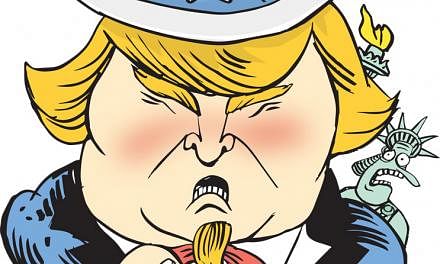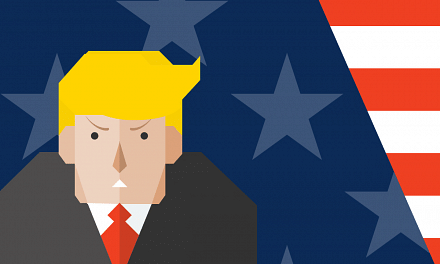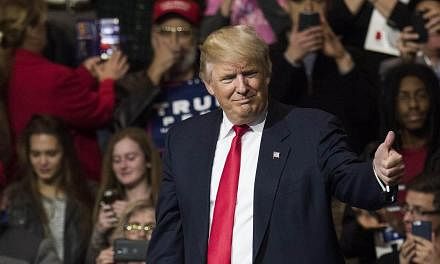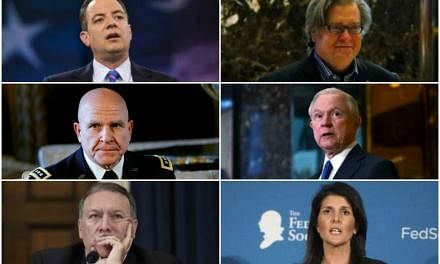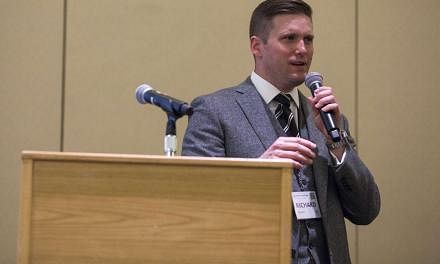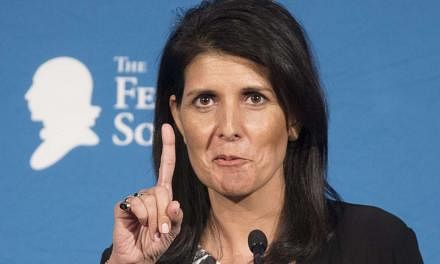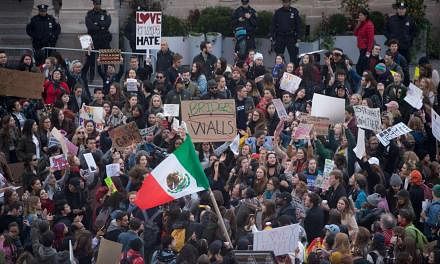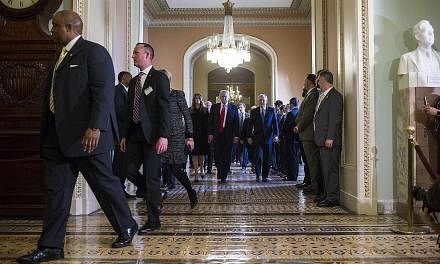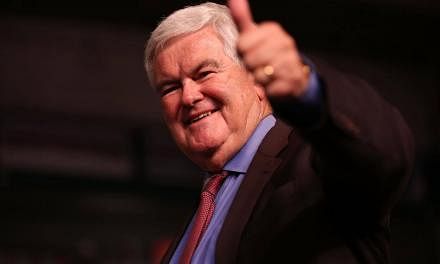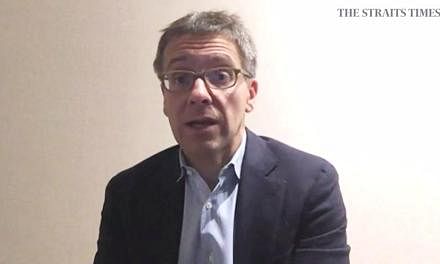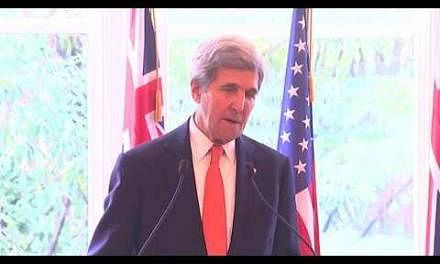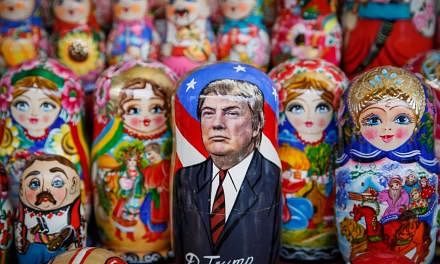Mr Donald Trump's surprise win of the US presidential election is causing much re-examination of pre-election analyses, the dominant theme of which was that his supporters are primarily non- college educated white working- class voters aggrieved at being "left behind" by globalisation.
On the Trump campaign trail, international trade competition, allegedly the result of "unfair trade deals" like Nafta and "currency manipulation" by China, was blamed for the loss of manufacturing jobs and industries like steel in the Mid-western "Rust Belt", especially in "swing states" like Ohio and Pennsylvania, and reliably Republican Indiana - all of which he won, as well as Michigan and Wisconsin.
But the size and sweep of Mr Trump's electoral college victory (despite losing the popular vote to Mrs Hillary Clinton) indicate that his appeal cannot be limited to this relatively small group, particularly at a time when the US economy is doing fairly well, unemployment is low, and wages have been rising, including in these states.
A closer look at Michigan may provide some early clues to explaining the election result. It had not voted for a Republican presidential candidate since 1988, and has Democratic senators but a Republican-dominated state legislature, and swings between Democratic and Republican governors.
TRADE AND JOBS
When I first came to Michigan as a student in 1973, it was very much the centre of the American, and global, automobile industry. A Chrysler auto-parts plant was the largest private sector employer in the university town of Ann Arbor, and with fellow economics graduate students I went on a UAW (United Autoworkers Union) tour of the Ford Motor Company's historic River Rouge plant in Detroit.
I was amazed at the high salary of the UAW supervisor who showed us around: at the time a typical autoworker earned enough to own two cars and a boat for summer recreational use on the many lakes in and around this Great Lakes state. As a teaching assistant, I occasionally had autoworkers' children in my introductory economics classes, and a decade later I gave paid lectures on globalisation to GM (General Motors)-UAW workers in a university-organised programme.
Competition from Japanese and European auto imports began in the 1970s, leading to decades of restructuring by the US "Big Three" (GM, Ford and Chrysler). This involved plant consolidation, automation, technological upgrading, geographical relocation (between states and countries) and worker layoffs, even as foreign automakers and suppliers also invested heavily in new US plants. Government loan bailouts were extended to the US industry during the global financial crisis, after which it came roaring back, achieving record sales and profits in recent years.
But autos are not the whole story in Michigan's economy. Other major multinationals headquartered here include Dow Chemical, Whirlpool (appliances), Kellogg (food), Steelcase (furniture) and Wolverine World Wide (footwear). Manufacturing employs 13 per cent of the state's workers (versus the national average of 9 per cent,) but is exceeded as an employer by trade, transportation and utilities (16.8 per cent), education and health services (14.6 per cent), and professional and business services (14.4 per cent), and matched by government (13 per cent). Non-farm employment has grown by over 2 per cent in the past year, the unemployment rate at 4.6 per cent is below the 4.9 per cent national average, and manufacturers complain about being unable to fill tens of thousands of job vacancies.
In line with the diversifying economy, 56 per cent of auto plants closed in Michigan between 1979 and 2010 have been "repurposed" (converted to other uses), compared with 48 per cent of those in other states. Michigan is also one of the most export-oriented states, thus more likely to be hurt by Mr Trump's promised protectionism and the retaliation it would invite from trade partners. The Peterson Institute for International Economics estimates that in a "trade war", Michigan would lose more jobs than any state other than California.
These data suggest that frustration over trade policy, manufacturing decay and job loss are not the reasons that Michigan voters swung to Mr Trump (with a thin 0.3 per cent margin). Manufacturing employees are themselves increasingly white collar rather than blue collar, and include significant proportions of ethnic minorities - like Arabs in Ford's Dearborn operations as well as African-Americans, and some white factory workers still vote Democratic. Trump voters in Michigan were overwhelmingly white, but middle class and employed mostly in services rather than manufacturing.
RURAL VOTE
Mr Trump also benefited from the unprecedentedly large turnout of voters from rural counties which are economically sound (with the help of federal agricultural subsidies) and overwhelmingly white. A Wall Street Journal analysis found that small towns in the Mid-west diversified more quickly than other parts of the United States between 2000 and 2015, as a result of Latinos moving into heavily white areas. These counties voted heavily for the immigrant-bashing Mr Trump, even though the Latino influx contributed much-needed labour to prospering commercial farms, and revitalised small towns earlier depopulated when industry consolidated in larger urban areas.
These local observations suggest that "identity politics" is more responsible for Mr Trump's victory in Michigan than the trade-induced economic dislocation that underlies the "white working class" narrative. Many whites whose own economic situation is secure are nonetheless discomfited by changes in society. The influx of large numbers of immigrants and ethnic minorities into a community, perhaps even the rise of an African-American president, creates a sense of "outsiders taking over your space". And it may be that the more affluent and educated the newcomers, the more galling to locals as that feeds into the narrative of pampered "global elites" contributing to "rising inequality".
This applies to university places as well. Thirty-odd years ago, my MBA classes at the University of Michigan, and my faculty colleagues at the business school, were overwhelmingly white males. Today white males are a minority in my classes, with females, non-white Americans, and international students together constituting the majority. White males occupy only a third of the faculty offices in my corridor. Regardless of ethnicity and national origin, our faculty and students are predominantly of liberal economic and social, and therefore likely political, persuasion.
We are also the "global elite" and "experts" much vilified in the spreading populist backlash against trade, immigration and international capital in both Europe and the US. And we are the prime beneficiaries of not only globalisation, but also of technological change. Thirty years ago the plurality of my graduating MBA students took management jobs in Mid-western manufacturing companies, including in small towns, and mostly hailed from the Mid-west themselves. Today they come from all over America and the world, and their post-graduation jobs are disproportionately in consulting and finance in coastal cities. Our largest MBA employer back then was the local company, Ford; now it is Amazon of Seattle which hires many international students.
In Ann Arbor today, our largest private sector employer is Toyota's Tech Centre; others are Hyundai's Tech Centre and Google. All employ engineers and other highly skilled "techies" from all over the world, a far cry from the blue-collar production workers of the now long-gone Chrysler parts plant.
Even prior to the recent presidential campaign, I sometimes wondered what our mainly white, local Michigan staff thought of all this, as they performed the many necessary non-instructional tasks that made the university and our teaching hospital run. Their parents would have been high-earning factory workers, self-employed skilled tradesmen or small business owners, and their grandparents probably farmers. Many commute to work in expensive Ann Arbor from small communities as much as an hour's drive away.
Several years ago, one of our support staff told me: "My children will never study at this university. We can't afford it, and even if we could, I wouldn't want them to, because the kids here have an attitude." I knew that she meant arrogance and entitlement. The University of Michigan has long been considered the best public university in the country. But it is also one of the most expensive, with a particularly high ratio (40 per cent) of out-of-state students among the undergraduate population.
Our classrooms are now filled with the children of college- educated professionals, so much so that there is a special programme to recruit and assist students who would be the first generation of their families to attend college. Financial aid is provided for low- income in-state students and those from under-represented (mainly rural, white) Michigan counties. They attend classes with the well- schooled children of New York bankers and lawyers, and in the dining halls wait tables (as part of their financial aid packages) on US boarding-schooled only-children from China who live in luxury apartments, wear designer clothes and drive Ferraris and Maseratis.
Ann Arbor has been ranked the best-educated city in America, and pollsters told us that the highly educated were much more likely to vote for Mrs Clinton, who did win 68.4 per cent of our county-wide vote. But Mr Trump still won 26.9 per cent, despite the concentration here of several colleges and universities. In the rural south- western Michigan county where my husband grew up, 62.6 per cent voted for Mr Trump and 31.7 per cent for Mrs Clinton. On our infrequent visits, the countryside and small towns around have looked more prosperous in the past decade than in previous ones, with automated irrigation works in the large seed-corn fields, buildings nicely painted, with fewer boarded- up windows and for sale signs. There is also a new presence of Latino workers and their families.
Mr Trump boasted before the election that his victory would be "much bigger than Brexit". Workers at the Nissan factory in Sunderland, UK voted heavily for Brexit, even though much of their production was for the European Union market, and they risked Nissan forgoing further investment. Voters were prepared to vote against their own economic interests in order to, they felt, preserve their "traditional way of life" against excessive immigration.
In Michigan's case, if President Trump enacts the protectionist trade policies he has advocated, the state's highly-globalised auto industry would be adversely affected by disruption of its complex cross-border supply chains and international markets. This would result in fewer rather than more factory jobs. But in a contest between economics and emotions tied to a perceived cultural and national identity, Brexit and Mr Trump's election show us that emotions are likely to triumph.
- The writer, an economist, is professor of strategy at the Stephen M. Ross School of Business, University of Michigan.
